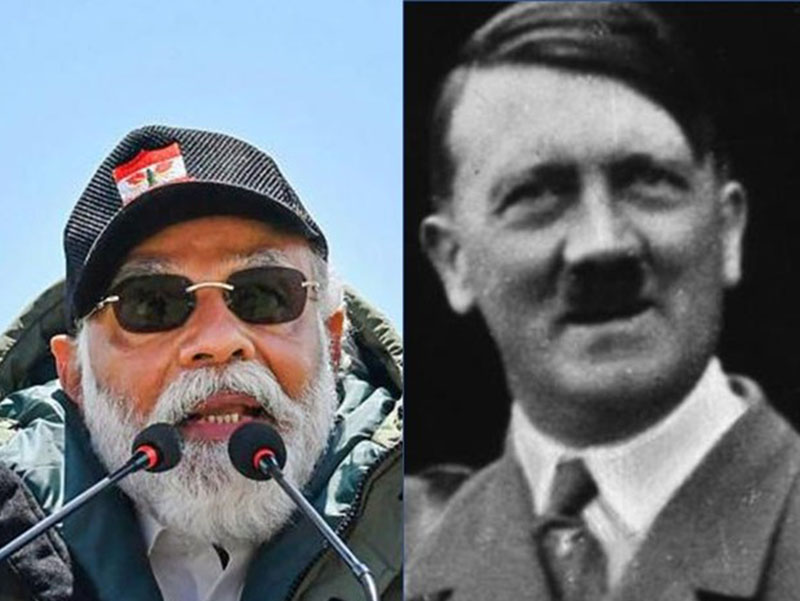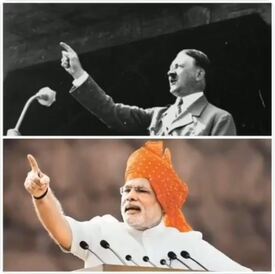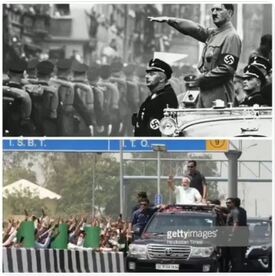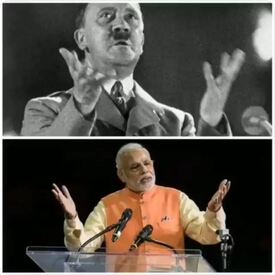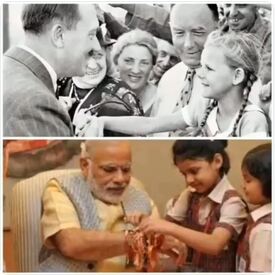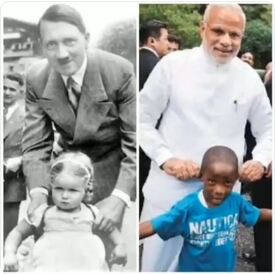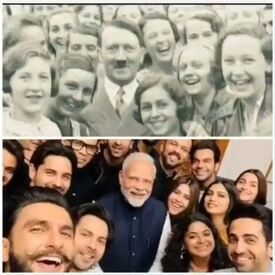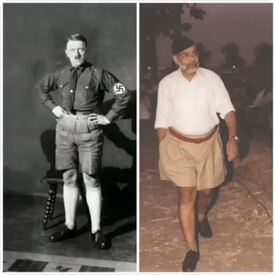By Celine Mary, First published on 5 September, 2020
History often repeats itself; so they say. So, I tried to juxtapose pieces from German history, with current events to see if I could see any repetition.
Do you see the same similarities that I see?
1. Fishing in troubled waters, turning mishaps to opportunities: Post the first World War in Germany, the Treaty of Versailles was the platform that the extreme right wing needed to catapult itself into the limelight. The common German forgot that he was the one who had hailed in the fall of the Kaiser, had initially welcomed parliamentary democratic reform, and had rejoiced at the armistice. Now he was told by an active propaganda machinery, only to remember the legend that the German Left—Socialists, Communists and Jews had surrendered German honor into the hands of foreigners.
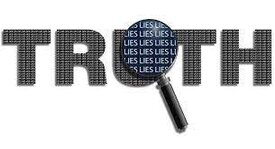
“Propaganda tries to force a doctrine on the whole people… Propaganda works on the general public from the standpoint of an idea and makes them ripe for the victory of this idea.” Adolf Hitler wrote these words in his book Mein Kampf about this powerful weapon called propaganda. He fed the common man with the Dolchstosslegende (stab-in-the-back legend) and the purported evil of the “November Criminals”. Every problem in Germany was now because of the Left – Socialists, Communists and Jews.
The burdensome reparations from the treaty, coupled with a general inflationary period in Europe in the 1920s, caused steep hyperinflation of the German Reichsmark by 1923. This hyperinflationary period combined with the effects of the Great Depression (beginning in 1929) undermined the stability of the German economy, wiping out the personal savings of the middle class along with burdening them with massive unemployment.
But this breakdown was used by Hitler to his advantage to further his claims of betrayal at the hands of the November Criminals.
2. Creation of the Hero: The ‘Hitler myth’ was created to the effect that there was only one man who could take the German nation back to it’s past glory.
A myth was created that by being hard, ruthless, resolute, uncompromising and radical, he would destroy the old privilege and class-ridden society and bring about a new beginning, uniting the people in an ethnically pure and socially harmonious ‘national community’. The Nazi party members started comparing him to Napolean and describing him as Germany’s Mussolini.
The introduction in 1926 of a compulsory ‘Heil Hitler’ style of greeting among party members was an outward sign of their bonds with their leader.
He was presented to the common German as the struggler; with the title of his book ‘Mein Kampf‘, creating an image of the struggle of the ‘little man’ against society’s ‘big battalions’, and his mortal struggle against Germany’s powerful internal and external enemies to assure the nation’s future.
On January 30, 1933, the National Socialist German Workers’ Party (Nationalsozialistische Deutsche Arbeiterpartei; NSDAP), more commonly known as the Nazi Party, assumed control of the German state when German President, Paul von Hindenburg appointed Nazi Party leader Adolf Hitler as Chancellor at the head of a coalition government led by the Nazis and
the German Nationalist People’s Party (Deutschnationale Volkspartei; DNVP).
Nobody found it odd that it was this Hitler who had earlier led an unsuccessful coup against the democratically elected government and had spent 9 months in prison for treason. Hitler had reinvented himself, entering politics and vowing to win elections, to gain power through majority vote, and then reform the German government. The people who voted his party in, didn’t ask him to prove his commitment to democratic principles, even though they knew what he had originally strived for.
3. Creation of conspiracies to gain absolute power : On February 27, 1933, the German parliament (Reichstag) building mysteriously fell victim to arson. Though the origins of the fire were still unclear, the coalition government (made up of Nazis and the Nationalists) went to town, blaming the Communists. The next day, the Reichstag fire was exploited to secure President Hindenburg’s approval for an emergency decree, popularly known as the Reichstag Fire Decree, that suspended individual rights and due process of law. The Reichstag Fire Decree permitted the regime to arrest and incarcerate political opponents without specific charge, dissolve political organizations, and to suppress publications. It also gave the central government, the authority to overrule state and local laws and overthrow state and local governments. The decree was a key step in the establishment of the Nazi dictatorship.
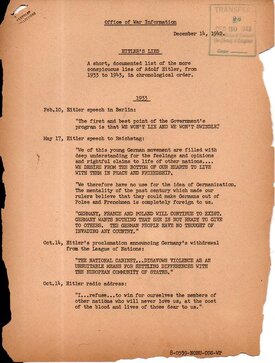
And Germany became a police state in which citizens enjoyed no guaranteed basic rights and the SS (Schutzstaffel), the elite guard of the Nazi state, wielded increasing authority through its control over the police.
4. Creation of imagined enemies : On 1st April, 1933, less than 3 months after coming to power in Germany, the Nazi leadership staged an economic boycott of Jewish-owned businesses and the offices of Jewish professionals. The boycott was presented to the German people as an act of revenge, justifying the bad international press against Germany.
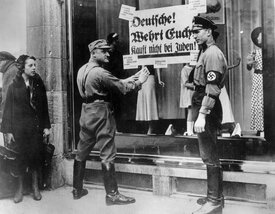
The word on the street was that since the appointment of Hitler’s government in January 1933, the German and foreign Jews were spreading “atrocity stories”, to damage Germany’s reputation. Nazi Storm Troopers stood menacingly in front of Jewish-owned department stores and retail establishments, and outside the offices of Jewish professionals, holding signs and shouting slogans such as “Don’t Buy from Jews” and “The Jews Are Our Misfortune.” Few would have thought that this boycott would mark the beginning of a nationwide campaign by the Nazi Party against Jews in Germany that would culminate in the Holocaust.
5. Infiltrating education : Children in schools were indoctrinated with love for Hitler, obedience to state authority, militarism, racism, and anti-Semitism. A school poem read as:
My Führer (The child speaks)
I know you well and love you dearly
Like father and mother.
I want to always be obedient to you
Like I am to father and mother.
And when I grow up, I will help you,
Like I will father and mother.
You should feel joy because of me,
Like father and mother!
On 10th May, 1933, university students burnt about 25,000 “un-German” books in Berlin’s Opera Square. Some 40,000 people gathered to hear Joseph Goebbels deliver a fiery address saying “No to decadence and moral corruption!” Among the authors whose works were burned was Helen Keller, an American whose belief in social justice had encouraged her to champion disabled persons, pacifism, improved conditions for industrial workers, and women’s voting rights.
6.Contempt for intellectuals, rationalists and liberals : In Mein Kampf, Hitler complained about over-education and intellectuals were frequently the butt of Hitler’s jokes.
‘Hitler Youth’ and the ‘League of German Girls’ were overtly instructed to aim for character-building rather than education.
The Education Minister, Rust ordered teachers training colleges to relocate from “too intellectual” university centers to the countryside, where they could be more readily indoctrinated and would also benefit from contact with the pure German peasantry. Jews were accused of being intellectuals and having a destructive “critical spirit.” Book burnings were hailed by Goebbels as ending “the age of extreme Jewish intellectualism.”
7. Window-dressing publicity campaigns for the International crowd : The 1936 Summer Olympic Games at Berlin was a huge publicity success for the Nazi government, as German officials made every effort to portray Germany as a respectable member of the international community. They removed anti-Jewish signs from public display and restrained anti-Jewish activities. In response to pressure from foreign Olympic delegations, Germany also included the half-Jew fencer, Helene Mayer, on its Olympic team.
Germany also lifted anti-homosexuality laws for foreign visitors for the duration of the games. A law which was against its own citizens was eased out for the foreign visitors.
So, how does History repeat itself? Do leaders re-incarnate? I think the answer is simpler. Exactly like you and I read through history and take notes, there are others doing the same. They are learning from History exactly like us. Which part of history gets repeated depends on its students’ response.
While some may want the Nazi – like dictatorial history to repeat itself, a lot will depend on the response of those who dont want the same.
Do you think it is too far-fetched in today’s scenario?
I sincerely hope you are right.
But do remember, Germany was a Democracy (though a young one) before Hitler came.
Disclaimer: The opinions expressed within this article are the personal opinions of the author. AlignIndia does not take any responsibility for the content of the article.
Celine Mary is a social media activist fighting against post-truth and for secular values


